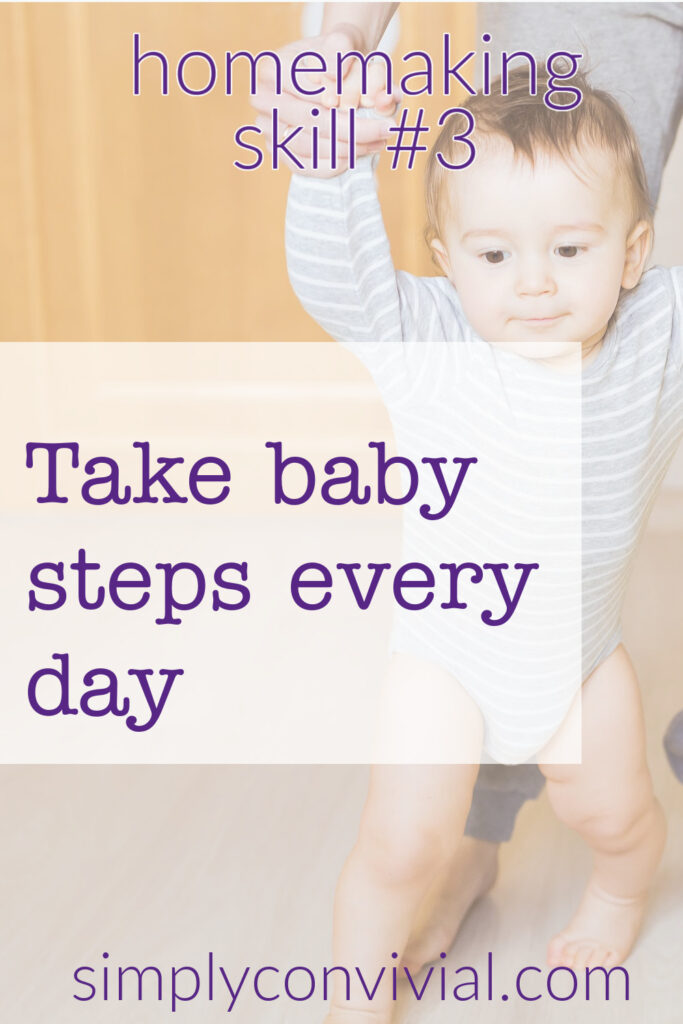When we underestimate how much we can – or even should – do in a day or week or year, we can excuse ourselves with the label of humility. I just can’t keep my home in order. I just can’t manage my temper.
Excuses are not humble.
Many of us struggle with a false kind of ambition and a weak sense of commitment. If we want to be skillful homemakers whose hearts and checklists are aligned with God’s purposes and glory, then we’re going to need true ambition and strong commitment.
Are we ready for that?
My new book, Simplified Organization: Learn to Love What Must Be Done, is all about the six skills of homemaking, and half of them are mental-emotional skills for a reason. We need to change our approach, our mindset, about housework before we’ll find joy and satisfaction in it – but joy and satisfaction — and traction — are totally possible, no matter how bad your attitude has been about homemaking up until this point.
Don’t miss the rest of the series:
Humility doesn’t make excuses
If lethargy, apathy, and stagnation characterize our days, we might be letting ourselves off the hook by thinking that we’re ok being small and humble.
But humility actually has nothing to do with being unambitious, lazy, and low-energy. Sometimes low-energy is the struggle God has placed us in to grow us. Sometimes low-energy is our own-dumb-fault mode we’ve stuck ourselves in because of our own fear of failure or fear of effort.
Humility has no place for fear, because humility is taking our proper place and not seeking a position of control or fame that has not been given. Jesus was humble, but the desire to save the world and be seated at the right hand of God in glory moved him to do his duty and suffer.
In the same way, we are willing to do our duty, to both suffer and rejoice, because of the joy placed before us – the recognition of God’s call on our life. God’s call leaves no room for apathy and satisfaction with status-quo.
Humility says, “Here I am, Lord, use me however you see fit,” and then does her duty – just like Mary. Humility does not bury the talent given out of fear of unknown outcomes.
Faith pairs well with humility. In humility, we obey and follow our Savior. By faith, we work and trust God for the outcomes He has promised, knowing that it’s ok if it doesn’t turn out our way.
(P.S. Our theme inside Convivial Circle for the month of March will be “No Excuses” – not about grit and mere willpower, but about gaining self-awareness for where blameshifting is paralyzing us)
Humble baby steps
Baby steps are inherently humble. Baby steps recognize that we are mere creatures and not gods. We will not be able to call forth something from nothing. We will not wake up totally different tomorrow because we want to. Our efforts will not yield instant, predictable results.
Baby steps are the way God asks us to live in this world. Every day, we faithfully do the work God has placed before us. Every day, we let go of our selfish desires and put others before ourselves. Every day, we take small steps of faithfulness that don’t look like much in the moment, but add up to a significant, joyful life.
Every desire for instant gratification and a quick fix is antithetical to both baby steps and humility.
If you have a project before you – whether it’s meal planning, pantry organizing, chair reupholstering, or homeschool planning – know what you’re aiming for, but don’t spin your wheels overdeveloping the end result.
Instead, identify the next small step to take to move you toward your aim. Do it. Then identify the next small step.
When you feel paralyzed by a project or by having a million things to do and a habit of doing none of them, just set a timer for 5 minutes and do one thing – wash some dishes, start dinner, or brain dump.
That’s a humble willingness to offer your efforts of faithfulness to God. Rely on Him to sustain you, to grant clarity, and to work more and better through your efforts than you think.
Humility does make commitments
A baby step is humble, but it is also active. We stay paralyzed and stuck when we fear committing ourselves to some unknown outcome, to the risk of failure or to the possibility of exhaustion.
For myself, the apathy and lethargy I suffered from in my twenties was the self-inflicted misery of pride. Some people want to be the best and work hard for it. Some people want to be the best, know they won’t be, so they don’t try at all and can even become the worst instead. That’s the direction my perfectionism and pride took me – and it’s not uncommon among women.
After choosing to stay at home, and knowing it’s the right thing to do, we then also buy and act on the lie that it’s an unambitious, small, insignificant way to live. So we accept that and embody that expectation.
What if, instead, we stay home and excel, whether or not anyone but our God notices? That’s a baby step of humility that requires active duty yet shuts down pride, perfectionism, and apathy.
God is not silent in Scripture about what he desires from families, from mothers, from Christian homes. Let’s commit to search the Scripture and put into practice what we find there, baby step by baby step, even if we don’t understand the end before we begin.
We begin by faith, not sight. We begin humbly, not demanding to see all ends and whys and wherefores first.
But let’s definitely begin.
Grow your homemaking skills
Homemaking is women’s work and it matters immensely. We can commit to it, grow in it, and love it – no matter where we’re starting from at this moment.
Tomorrow I’ll have step 4 for becoming a more skillful homemaker. Stay tuned.
Dig deeper by getting my book, Simplified Organization: Learn to Love What Must Be Done. It’s available in paperback, on kindle, and via Audible (yes, read by me).
Make 2024 the year of embracing cheerful, competent homemaking.
Take my new 6-module course (one module per step!) Learn to Love What Must Be Done – this week lifetime access is 50% off!




